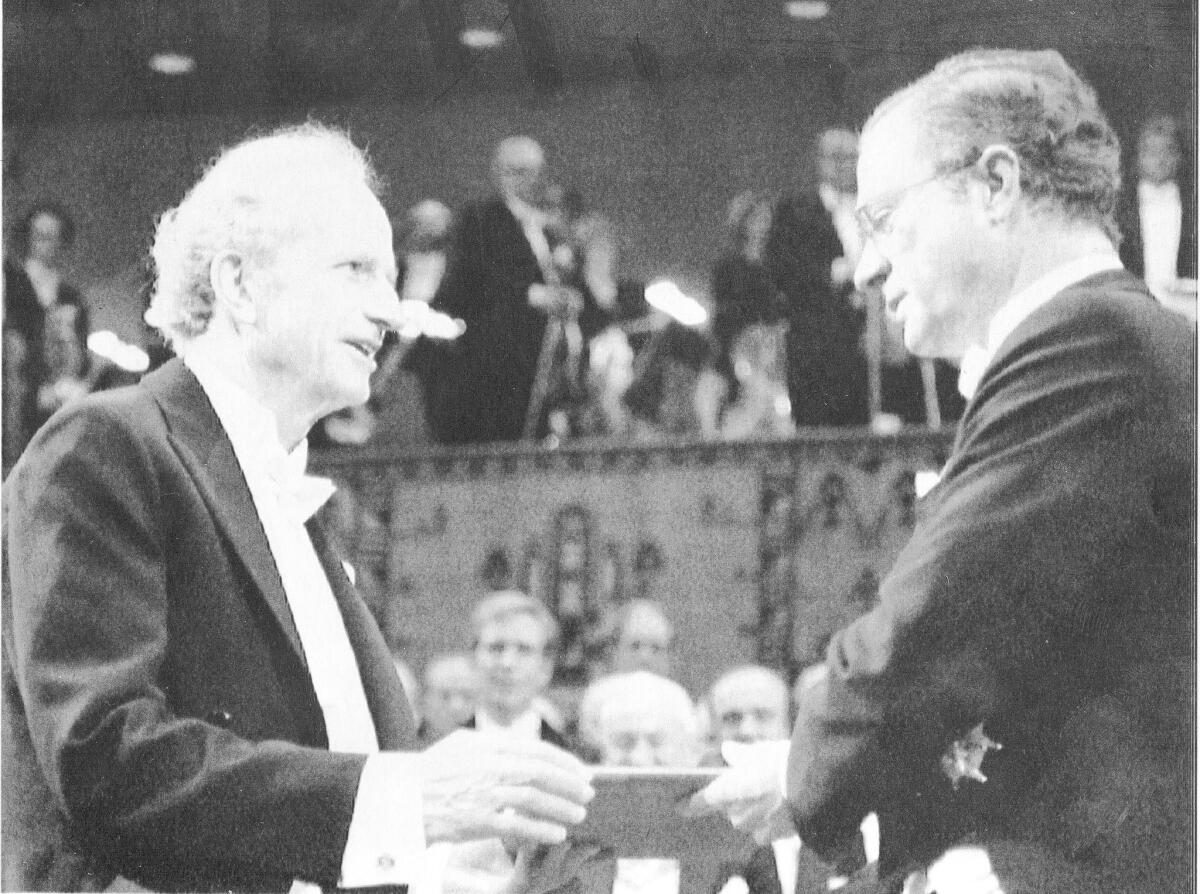Gary Becker dies at 83; Nobel Prize winner in economic sciences

Gary Becker, a University of Chicago professor who received the Nobel Prize in economic sciences and is credited with pioneering the approach to economics as a study of human behavior, died Saturday at age 83.
Becker’s stepson, Mike Claffey, said Becker died at a Chicago hospital of complications after an extended illness. The economist was ill over the last several months with a recently diagnosed stomach ulcer, Claffey told the Chicago Tribune.
When Becker became a Nobel laureate in 1992, he was cited for applying economic analysis to a wide range of issues that economists seldom had targeted.
Becker studied the decisions of everyday people in a fashion previously reserved for companies and national economies. Through the lens of economic incentives, he looked at how people choose their spouses, decide where to live, choose what to do, and determine whether and when to have children. His concept of “human capital” — which also was the title of his 1964 book — compared families to small factories.
“Most of my career, this was considered way-out economics,” he told The Times in 1992. “Some people would call it crazy economics — not even economics at all. I went against the grain of the profession for a long period of time.”
Before Becker began publishing his ideas in the late 1950s, most academics considered habit and often emotion or irrationality as the primary factors in human behavior such as having children or committing crimes.
The key to his research is the theory that human behavior follows the same rational principles, whether it involves a household, a business or an organization. Though greeted initially with skepticism, his work influenced sociology, demography and criminology.
Becker’s mentor was famed economist and fellow Nobel laureate Milton Friedman. The school honored them in 2011 with the Becker Friedman Institute for Research in Economics. Becker was named chairman of the institute.
“Being a student of Milton’s was magic indeed,” Becker once recalled. “People would always ask me, ‘Why are you so excited? Are you going out on a date with a beautiful woman?’ I said, ‘No, I’m going to a class in economics.’”
Born Dec. 2, 1930, in Pottsville, Pa., Becker was the son of European immigrants. He earned his undergraduate degree in mathematics at Princeton University and his master’s and doctorate from the University of Chicago. He taught at Columbia University and did research at the National Bureau of Economic Research.
Becker received many awards over his career, including the Presidential Medal of Honor in 2007.
A political conservative, he was named to California’s 16-member Council of Economic Advisors by Gov. Pete Wilson in 1993 and Gov. Arnold Schwarzenegger in 1996.
In works including “The Economics of Discrimination” (1957) and “A Treatise on the Family” (1981), he delved not only into domestic relations but also the effectiveness of schools and the causes of addiction. Criminal acts, he suggested, are often rational decisions, weighed by criminals against the likelihood of punishment.
For years, Becker advocated selling foreign citizens the right to immigrate to the U.S.
In Chicago GSB magazine, a publication of the University of Chicago Global School of Business, he acknowledged in 2008 that “people will say it’s repugnant to sell citizenship, that it’s contrary to the traditions of the United States.”
In fact, it would be more democratic than the current system, he said. “This opens the opportunity to everybody, including the unskilled person from Mexico, who says: ‘I want to go to the United States. It may be expensive for me but my children can take advantage of it.’”
Doubtful about the effectiveness and fairness of many government programs, Becker opposed government rules to aid people with disabilities. He was a critic of affirmative action and a supporter of school vouchers.
A number of feminist scholars were upset when he received the Nobel Prize, saying his theories appeared to support a wage gap between men and women.
“If working women really understood what he was saying, it would make them furious,” economist Sylvia Ann Hewlett told The Times in 1992. Hewlett criticized Becker for an analysis of the workplace that, in her view, overlooked the constraints imposed on women, particularly working mothers, by discrimination.
Others objected to Becker’s application of economic jargon to families, with children seen as “consumer durables” and long-term marriages as generating “marital-specific capital.”
Becker said some of his critics misunderstood him and other were “substituting what they’d like to see for a realistic analysis of the situation as it is.”
Becker is survived by his wife, Guity; two daughters, Catherine Becker and Judy Becker; a sister, Natalie Becker; two stepsons, Cyrus Claffey and Mike Claffey; two stepgrandchildren; and two grandchildren.
Stephanie K. Baer, a reporter for the Chicago Tribune, contributed to this story.
More to Read
Start your day right
Sign up for Essential California for the L.A. Times biggest news, features and recommendations in your inbox six days a week.
You may occasionally receive promotional content from the Los Angeles Times.






